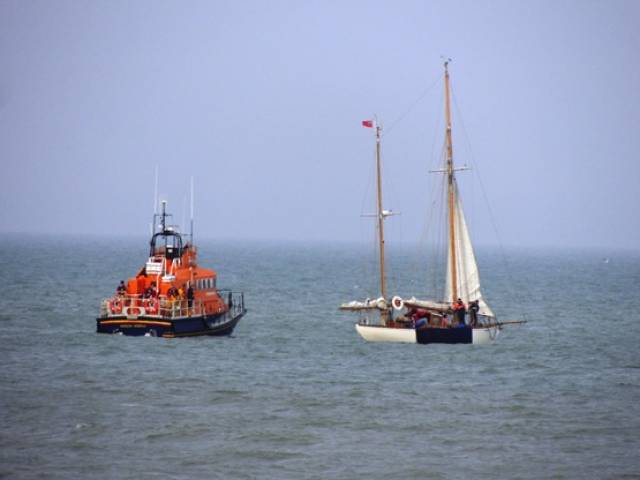#RNLI - Lifeboats from Arklow and Bangor were out on the water for separate callouts on May Day yesterday in what made for a busy weekend for the RNLI crews.
In Arklow, RNLI lifeboat volunteers were alerted by pager around 7pm on a fine Sunday evening (1 May) to a call for help from a vintage sailing vessel.
The lifeboat Ger Tigchleaar was launched within minutes to the classic boat, which has suffered engine failure and was stranded just east of Arklow Harbour.
The Arklow RNLI volunteer crew established a tow line and proceeded to tow the vessel safely back into Arklow. The five experienced crew members on the casualty vessel remained aboard during the tow home and all hands came ashore safely at Arklow.
Speaking after the incident, volunteer lifeboat press officer and community safety officer Mark Corcoran said: "On this, the RNLI’s Mayday fundraising weekend, our fundraising team and boats crew have been busy with all kinds of fundraising events.
"Even after a long day of fundraising our dedicated volunteers turned up this evening en masse to go to the aid of the crew of this stricken vessel.
"We’re all very proud to be involved with the RNLI, so please give generously to the Mayday campaign to help keep us doing what we do, which is saving lives at sea."
Elsewhere on the same evening, Bangor RNLI’s volunteer lifeboat crew launched to the aid of a RIB with engine failure just off Royal North Yacht Club in Belfast Lough.
Although not in immediate danger, a strong breeze was blowing the vessel, with one person on board, offshore. Thankfully the Bangor inshore lifeboat was able to tow the RIB in to Royal North without incident.
Bangor RNLI volunteer helmsman Gareth Whan said: “The crew and I are delighted to have been able to return this vessel safely to shore. Engine failure can happen in the best-maintained boat, and we are pleased to have been able to help.”
This was Bangor RNLI’s second callout of the weekend. On Friday evening (29 April) they were asked by Belfast Coastguard to assist Lagan Search and Rescue and other emergency services in a detailed search of Belfast Harbour for a person in the water.
Sadly, this callout did not have a happy ending. The search was called off after three hours, and resumed on Saturday morning. However, it was only yesterday (Sunday 1 May) when a body was found by police divers.
Bangor RNLI extended its sympathies to the family of the man and all involved in the attempted rescue.
“It is sadly appropriate that both of these launches happened during the May Day weekend, a key fundraising time for the RNLI, and highlight the importance of the work our volunteers do,” said Bangor's deputy launching authority Bryan Lawther.































































